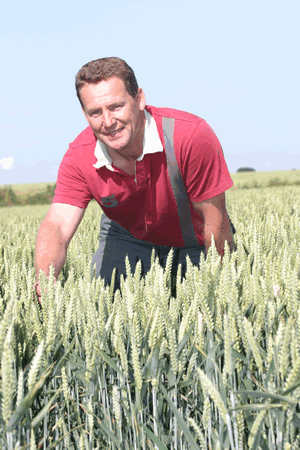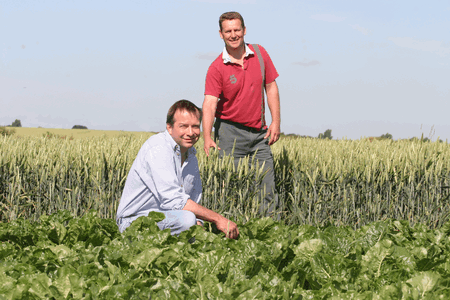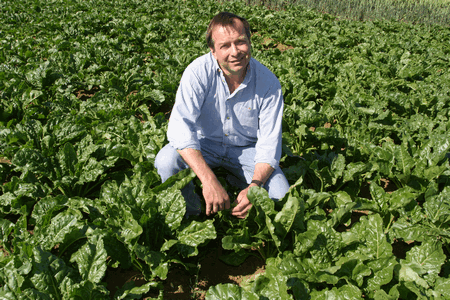Sugar beet growers weigh up the options

Once an arable mainstay, sugar beet faces an uncertain future. Johann Tasker meets a farmer who has decided to stop growing it – and another who will continue
Sugar beet has been grown on Paul Morris’s farm in the heart of the Cambridgeshire Fens for the past 60 years. But after this autumn – for the first time since the 1950s – no beet will be grown at all.
Soil types on the farm at Little Thetford vary from light land to heavy loam. “If everything goes in our favour, we can achieve 70t/ha on isolated fields. But we like to lift in early September on our heavier soils and those fields only average 50t/ha.”
Last year was a disaster – as it was for many beet growers. Poor weather meant the crop of some 80-90ha came out of the ground at less than 34t/ha. But even in a good season, yields have seldom risen above 60t/ha across the farm.
Despite being the farm’s most profitable enterprise for decades, its labour intensive nature meant beet was increasingly in the firing line. So did the fact that wheat drilled after late-lifted beet consistently yields 1.24t/ha (0.5t/acre) less grain.

The halcyon days when beet was worth £40/t are rapidly becoming a distant memory. With beet now worth little more than £24/t, many growers feel unable to achieve the yields of 70t/ha that would make the crop profitable.
Pure economics, says Mr Morris, are finally forcing him to quit. Last year, he leased out his quota for free so he could fulfil his beet contract while simultaneously ensuring he was entitled to any future compensation for giving it up.
Now, with British Sugar itself giving away quota, Mr Morris can’t find any takers. Once the current season’s crop comes out of the ground, no more beet will be grown on the farm – either by Mr Morris, or by anyone else.
British Sugar says so far only 11 contracts have been cancelled for 2009, which reflects an ongoing decline in beet growers over the past 20 years. In 1990, more than 10,000 farmers grew beet. For 2009, the company expects to issue 4750 contracts.
Like Mr Morris, many more growers are considering their options as the 15 August deadline nears for the return of 2009 contract offers. Anyone who misses the deadline will see British Sugar reallocate their contract tonnage to other growers.
The main reason for quitting is the massive drop in the beet price coupled with higher cereal values, Mr Morris explains. “You can’t argue with the figures. Wheat at £150/t off the combine at 8.5t/ha is better than £20/t for beet at 60t/ha.
But high input prices have also paid a part. Soaring red diesel costs have seen some contractors quoting £250/ha for harvesting and carting beet this autumn. “Beet just isn’t profitable any more – even if I share machinery costs with other farms.”
Mr Morris reserves a final broadside for British Sugar’s powerful monopolistic position as the sole buyer of Britain’s beet crop. The NFU sugar beet committee simply has no clout when it comes to price talks with the company, he adds.
“As far as I’m concerned, the idea of linking the beet price to cereal prices was ridiculous. With the beet price linked to wheat, the actual extra gain on the price for a tonne of beet is simply inadequate.”

A stone’s throw from Mr Morris, neighbouring grower Trevor Bedford at Paradise Farm has finally decided to stick with the crop – for now at least.
“I’ve been thinking ‘Shall I or shan’t I?’ for ages,” he admits. “I would never have signed a five-year contract but I am prepared to grow it on a year-by-year basis. It’s constantly under review but I do think prices will eventually come back.”
Mr Bedford, who grows 1000t of beet, averages about 50-62t/ha on heavy land. But he is able to make beet pay largely because he also runs a small contracting business, harvesting and drilling the crop for a handful of other local growers.
Fuel costs have made contract harvesting more expensive and wearing parts have trebled in price within a year. But spreading fixed costs this way keeps the job viable and Mr Bedford says it puts him at an advantage over many other beet growers.
The family farm started growing beet in the 1930s after the Ely sugar beet factory opened. It now supplies Europe’s largest beet factory at Wissington. “We’re 20 miles away, so we’re ideally placed really.”
But there are other advantages, too. “Our P&K indices are high because for a number of years we used to swap straw for muck,” Mr Bedford explains. “It means we don’t have to use any base fertiliser. If we had to, it would be a major issue.”

He also runs his own lorry, which he uses to haul grain as well as beet. “The money from the haulage helps to keep it on the road – I doubt if it would be worth running the lorry just for wheat.”
But like Mr Morris and many other beet growers, Mr Bedford is critical of British Sugar’s monopoly. “I hope the sugar price will increase in the near future and that any rise will be reflected in the beet price. But with a monopoly you can never tell.”
After last year, what he wants now is good weather and high sugar levels. “Beet was the mainstay of this farm for years. It’s a challenge to grow but I enjoy growing it. It’s been here for a long time and I’m not going to write it off on the basis of one year.”
Robin Limb, British Sugar’s agricultural development manager, dismisses Mr Morris’s assertions saying the NFU has successfully negotiated the most favourable beet contract in the European Union.
Growers in other countries envy the fact that British Sugar is paying 30% more than the EU minimum beet price, he maintains. And the deadline for the 2009 price options has been extended at the NFU’s request so growers have longer to consider them.
“More than half of the contracts returned so far have requested additional contract tonnage and we see this as a positive vote by growers for their continued support for the industry,” says Mr Limb.
British Sugar was allocating additional contract tonnage to willing growers on a temporary basis so the company could underpin its requirement for beet for bioethanol. This was possible due to anticipated higher prices forecast for 2009.
“The UK average yield of 60t/ha together with average predicted 2009 growing costs will deliver a gross margin that can match most combinable crops,” forecasts Mr Limb.
Even so, escalating production costs mean the only way forward for many growers is to strive continually for higher yields. Beet is the only major broad-acre crop with an average yield that increases continually year after year, says Mr Limb.
Regarding haulage, costs are expected to increase by 15% due to high fuel prices. But Mr Limb says the transport allowance paid to beet growers will increase by about 18% due to the shift in the pound/euro exchange rate.

